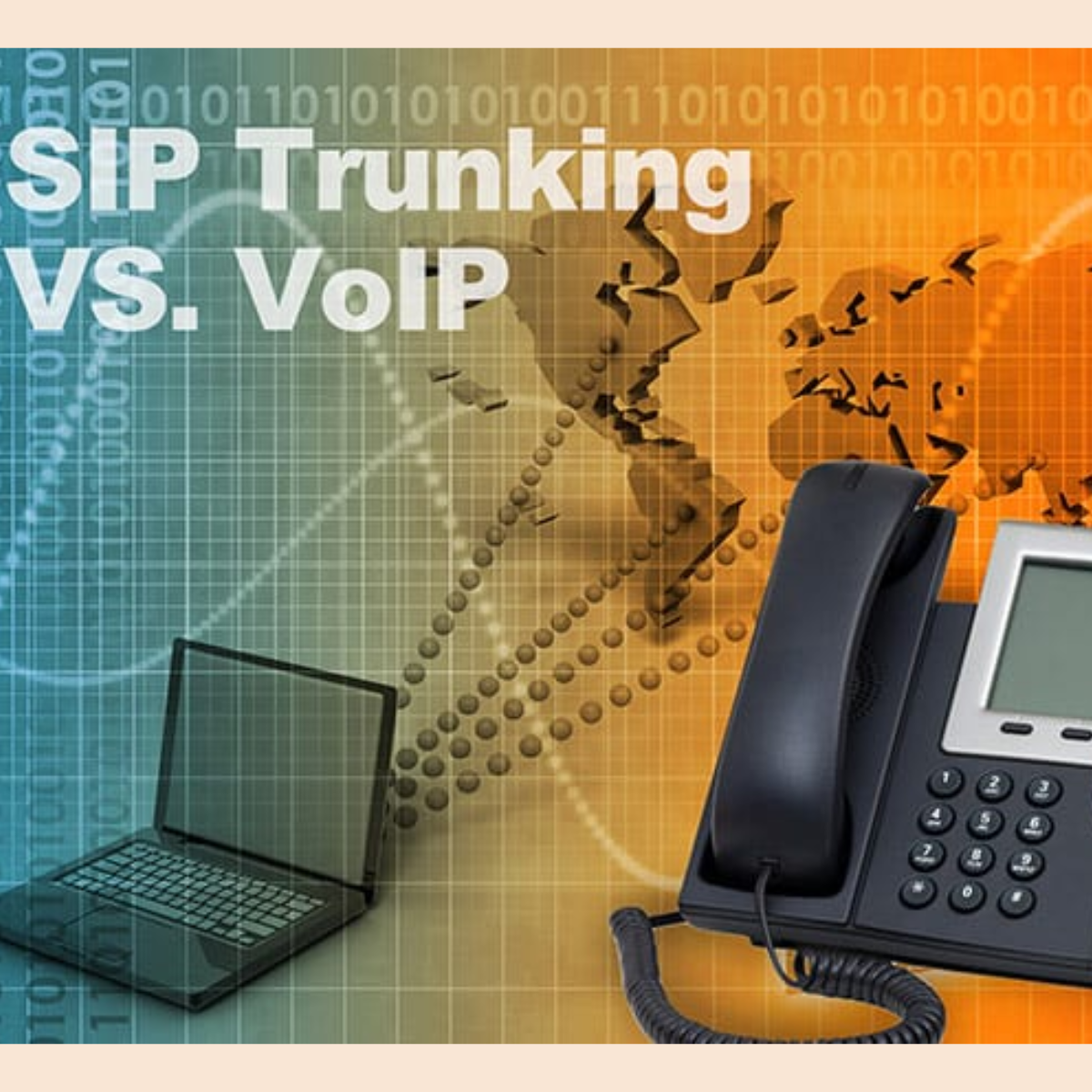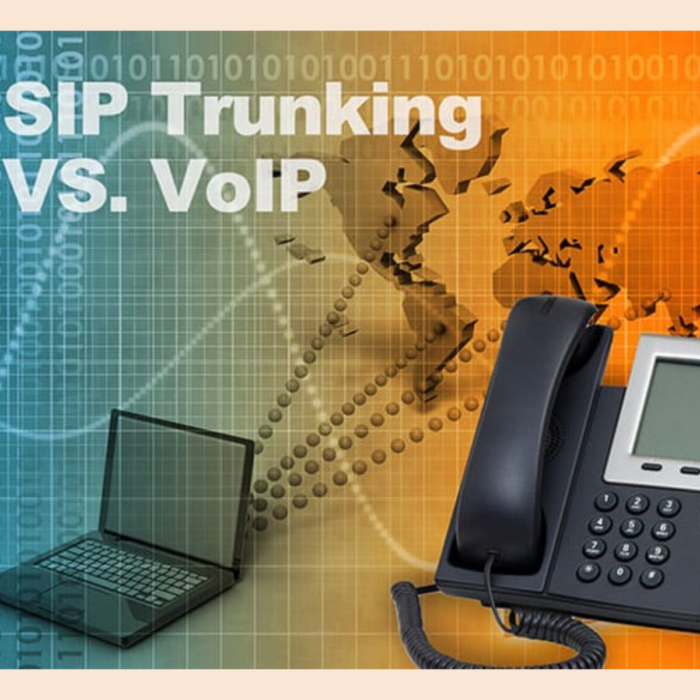Companies are always looking for solutions to raise their phone systems and general call quality in the current communication environment. SIP trunking &VoIP are two main technologies driving the most discussion. Although both are absolutely important for flawless communication, they offer different benefits and disadvantages.
We will discuss the variations of SIP trunking VS VoIP on this blog so that you might decide which provides better call quality for your company.
What does VOIP stands for?
Voice over Internet Protocol, or VoIP, is a technology enabling online rather than conventional phone line-based voice communications. Your speech is essentially turned into data packets, delivered across the web, and subsequently rebuilt at the receiver’s end into sound.
All you need with VoIP to begin making calls is an internet connection and a VoIP service provider. For companies seeking adaptability and economy, it’s a wonderful choice. VoIP also provides extras including instant messaging, video conferences, voicemail to email.
Though VoIP provides several conveniences, the quality of your conversation directly relates to your internet speed and reliability. Should your network show high latency or jitter, your calls could suffer from dropped connections, echo, or delays.
What is SIP trunking ?
Using an IP-based network, SIP—Session Initiation Protocol—trunking links your company phone system to the public telephone network (PSTN). SIP trunking manages phone, video, and other multimedia sessions unlike VoIP, which just addresses voice data. A SIP trunk provider presents a solution allowing companies to leverage the freedom of an internet-based connection while using their current phone systems.
SIP trunking services allow companies to simplify their communication infrastructure and cut expenses by substituting for conventional phone lines. SIP trunking gives a degree of adaptability and control that can improve general call quality since it can be applied with VoIP systems.
Call Quality: SIP Trunking vs. VoIP
SIP trunking usually provides the better call quality than others. The justification is given below :
SIP trunking gives companies sometimes a more dedicated connection than conventional VoIP systems. Less disruptions, lower delay, and generally improved audio clarity follow from this.
SIP trunk solutions are frequently more dependable if your company depends on significant call volume. SIP trunking lets you give voice traffic top priority over other kinds of data, therefore guaranteeing the required bandwidth for conversations. Conversely, VoIP systems make use of the same internet connection as any other program, which could cause congestion and worse call quality during busy times.
Many SIP trunk providers have failover systems, which guarantee that, should a failure occur, your calls are routed to a backup link. For companies managing customer service or sales conversations, this guarantees constant communication and better uptime—qualities absolutely essential. Particularly if they depend just on one internet provider, VoIP systems can lack this degree of redundancy.
Both VoIP and SIP trunking are quite scalable, however SIP trunking offers a better consistent call quality at scale—especially considering high call traffic. Whether your company is controlling seasonal call surges or experiencing fast growth, a SIP trunk provider can meet your demands without sacrificing quality.
VoIP’s Strength: Ease and Accessibility
SIP trunking edges ahead in terms of call quality, but VoIP has benefits of own especially for smaller companies or those just starting out. More plug-and-play, VoIP lets companies set up their phone networks without using specific gear. To begin phoning, all you need is a SIP phone service provider and a broadband connection.
Many startups choose VOIP for this convenience among other factors. It has low upfront expenses, is easily scaled, and integrates with cloud-based technologies. VoIP call quality can still be outstanding if your internet connection is strong. Small businesses would especially benefit much from VoIP services’ added capabilities—which include call statistics, voicemail transcription, and interfaces with customer relationship management (CRM) systems.
SIP Trunking for Bigger Companies
Conversely, larger companies or those with sophisticated communication requirements sometimes choose SIP trunking since it provides more control, higher quality, and seamless integration with current on-site phone systems. For companies trying to keep local numbers in several areas, SIP trunking is also perfect since it will increase consumer confidence and help to improve communication effectiveness.
Furthermore, SIP trunking solutions offer the scalability to meet both voice and video conference needs as your company expands, therefore helping you to future-proof your business communication systems. This makes it the perfect long-term fix for companies intending to upgrade their infrastructure for communications.
Which Should You Choose?
The size and requirements of your company will mostly determine which of SIP trunking or VoIP you choose.
VoIP: If you own a startup or smaller company, VoIP is rather sensible. Affordable, simple to set up, and loaded with tools to improve your company communication at little expense.
SIP trunking provides a more dependable and strong answer if call volume in your company is high and call quality is your top concern. Businesses needing multimedia communications or those answering foreign calls will especially benefit from it.
Choosing a SIP trunk solution makes sense for businesses who want the best call quality. It guarantees that, regardless of daily call count for your team, your communication stays absolutely clear. SIP trunk provider like DIDforSale give variable pricing policies so you may fit the service to the particular needs of your company.
Final Thoughts
In the end, both SIP trunking and VoIP can offer companies first-rate communication solutions. On the other hand, SIP trunking obviously provides the better solution if critical considerations are scalability, control, and call quality. While keeping flexibility and lowering costs, it gives companies the tools they need to effectively and without interruption answer calls.
Explore our SIP trunking services to find out how you can optimize your business communication systems today.








